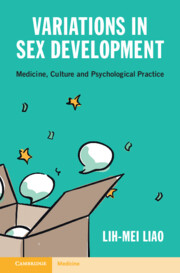Book contents
- Variations in Sex Development
- Reviews
- Variations in Sex Development
- Copyright page
- Dedication
- Contents
- Preface
- Abbreviations
- Section 1 Ordinary Lives
- Section 2 Medicalization and Resistance
- Chapter 2 Evolving Terms and Definitions
- Chapter 3 Medical and Psychological Controversies
- Chapter 4 Adult Outcome of Childhood Genital Surgery
- Chapter 5 Advocacy, Public Engagement and Healthcare Reform
- Chapter 6 The New Care Standard
- Section 3 Psychological Theories and Applications
- Section 4 Working Psychologically
- References
- Index
- Plate Section (PDF Only)
Chapter 2 - Evolving Terms and Definitions
from Section 2 - Medicalization and Resistance
Published online by Cambridge University Press: 18 November 2022
- Variations in Sex Development
- Reviews
- Variations in Sex Development
- Copyright page
- Dedication
- Contents
- Preface
- Abbreviations
- Section 1 Ordinary Lives
- Section 2 Medicalization and Resistance
- Chapter 2 Evolving Terms and Definitions
- Chapter 3 Medical and Psychological Controversies
- Chapter 4 Adult Outcome of Childhood Genital Surgery
- Chapter 5 Advocacy, Public Engagement and Healthcare Reform
- Chapter 6 The New Care Standard
- Section 3 Psychological Theories and Applications
- Section 4 Working Psychologically
- References
- Index
- Plate Section (PDF Only)
Summary
Chapter 2 begins with a brief summary of typical embryonic development of the urogenital and reproductive systems. Where the sex chromosomes, reproductive organs and the genitalia in combination do not fit the social categories of female and male, doctors and scientists used to call these physical outcomes hermaphroditism and intersex. They debated for a long time on the “true sex” of the individuals but could not agree on which of the biological sex characteristics should count as their true sex – should it be the sex chromosomes, the gonads or the genitals? Although in the age of genetics, much more is known about how the atypical features have developed. At the same time, people who are impacted by the variations are increasingly disputing medical framing of their differences. The twenty-first century was to seed a new and ongoing debate between the new medical term, differences in sex development (DSD) and intersex, which is now reclaimed by many impacted adults.
Keywords
Information
- Type
- Chapter
- Information
- Variations in Sex DevelopmentMedicine, Culture and Psychological Practice, pp. 15 - 31Publisher: Cambridge University PressPrint publication year: 2022
